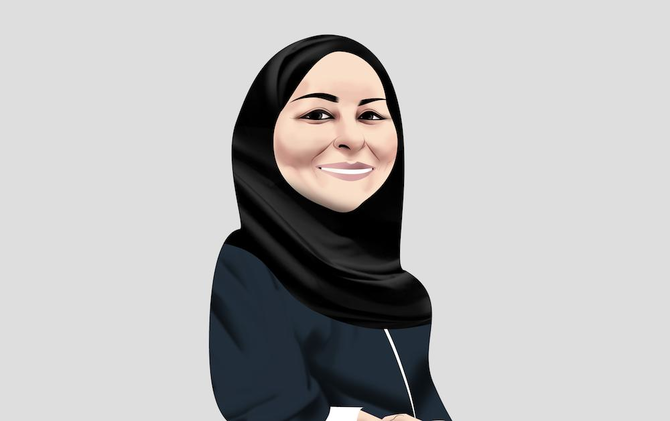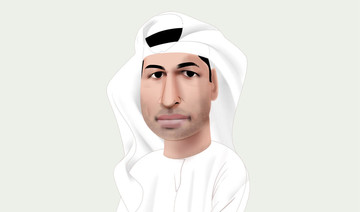RIYADH: Shaima Hamidaddin was in her element on stage under the bright lights of a special breakout session of the Bloomberg Global Business Forum in New York’s swanky Plaza hotel last week.
As executive manager of the Misk Global Forum (MGF) — the international arm of the philanthropic organization founded by Crown Prince Mohammed bin Salman — she has been instrumental in expanding Misk’s influence around the world, in the process drawing comparisons with the World Economic Forum (WEF), the original elite network of influencers.
“We’ve been dubbed the ‘Davos for youth’, and we have an immense amount of respect for WEF and what they’ve achieved, so we’d like to follow their lead. But we are a Saudi organization first,” she told Arab News.
The Plaza event — under the banner “How youth can shape the economy” — allowed Misk to assemble some big hitters in the entrepreneurial world, including Dara Khosrowshahi, chief executive of Uber Technologies, and Josh Giegel, co-founder of Hyperloop One.
Both are examples of hi-tech, entrepreneurial companies disrupting the global mobility business, at the same time helping to bring about the social transformation planned under Vision 2030, the long-term economic strategy for Saudi Arabia.
Along with co-panelists from the world of finance, employment and consumer goods, they gave a special Saudi twist to the discussion about what it is like being a young would-be entrepreneur in today’s fast-changing business world.
“There are so many similarities among global youth, common areas in what they need and the challenges they’re facing. It’s quite holistic. The future skills they need are the same for somebody in Saudi Arabia as for somebody in the US, Germany or Africa,” Hamidaddin said.
While she believes young Saudis face many of the same challenges as youth anywhere, there is perhaps another layer of complexity in the situation in the Kingdom.
“How do we encourage Saudis to be global citizens, and also how do we equip Saudis, and other young people, with the right skills, whether they want to go into social entrepreneurship or the private route or government route?
------
BIO
EDUCATION
University Of Sharjah
Insead
CAREER
Senior Administrator, Jebel Ali Free Zone Authority, UAE
Business Development Executive, Bin Hendi Enterprises
Brand Manager, Al Safi Danone
Business Development Manager, King Salman Youth Centre
Business Development Manager and Project Leader, Misk
------
“There are challenges for all young people in terms of globalization and technological advancement that are unprecedented. Young people have so much exposure to these things, but at the same time they want to cope with what makes them who they are from a cultural perspective, their beliefs and values. It’s not only Saudi youth who are facing that challenge — we are global citizens, but we want to stay true to what we are,” she said.
Misk was founded in 2011 with a mandate to “discover, develop and empower Saudi youth to become active participants in the future economy.” It focused on four key areas: Education, Creative and Digital Media, Technology, and Culture and Arts.
The foundation was an essential ingredient of the Vision 2030 strategy, then still being formulated. At its heart was the challenge of finding meaningful employment and livelihood for Saudi Arabia’s booming young population.
Under the old model which had lasted the Kingdom well since its foundation, the government undertook to look after citizens’ needs mainly through employment in the public sector fueled by high oil prices.
In the post-2014 era of the “new normal” in world energy markets, this was no longer feasible. A new economic model had to be found that would reduce oil and public-sector dependency. Vision 2030 was the result.
Hamidaddin’s background reflects the dynamics between the public and private sectors. After education and early employment in the UAE, Hamidaddin returned to Saudi Arabia to work in business development in the private sector, before joining Misk when it was launched. Five years later, she was selected to be one of the leaders of the MGF project.
The buzzword for MGF is “entrepreneurialism.” Self-starting entrepreneurs provide a third option in the public-versus-private debate, creating value, wealth and employment outside the big government and corporate structures.
The big high-tech giants of the West, well represented on the New York panel by Uber and Hyperloop, were prime examples of how the Saudi economy could evolve.
“Young people have an entrepreneurial spirit by nature, and are also innovative thinkers. So rather than going down the government route, or even with the large private corporations, they want to come up with their own solutions and make their own way, either via startups or joining hands with other organizations,” Hamidaddin said.
The old model of a government job for life is more or less a thing of the past, she believes. “By nature young people are less confined to staying in one place for many years. They stay maybe two or three years, then they’ve done that and they move on,” she said.
But not everybody can be a budding Bill Gates or Mark Zuckerberg, she recognizes. One challenge is to meet current demand and supply in the local employment, both in Saudi Arabia and the wider Gulf region.
Misk is to unveil a device to help solve this problem at its big Riyadh event in November, teaming up with another high-tech startup, the online networking giant LinkedIn, which is owned by Microsoft. It is another example of Saudi Arabia plugging into the global business network.
“We’ve partnered with LinkedIn to develop a global youth employment report, basically identifying what jobs are out there, what is the demand, and what is preventing the people applying for those jobs from filling the positions. We wanted to map it, in Saudi and in other countries, to see what kind of skills are missing,” Hamidaddin explained.
The LinkedIn report, drawing on the vast amount of information the company has on individuals and their employment histories, could be a catalyst for job creation in the Kingdom and the wider Gulf. “Saudi is the biggest population and the biggest economy in the Gulf, so if LinkedIn were to focus on one country in the region you’d expect it naturally to be Saudi,” she said, while insisting she could not speak for LinkedIn.
Other alliances with international companies are also likely for Misk. Hyperloop has already joined an internship program for young Saudi graduates, Hamidaddin said. “We had a group of young people who were very happy with their experience with Hyperloop and will do it again. We’re trying to upskill our young Saudis so they can do the kind of jobs Hyperloop creates — hi-tech, innovative and dynamic.
Hyperloop is backed by Virgin entrepreneur Richard Branson, who is involved in other big projects associated with Vision 2030. “Branson is definitely an advocate for the Kingdom and that’s why we wanted to link with Hyperloop. It will be the first of many links,” she said.
But perhaps the most eye-catching of the alliances Misk has formed with international groups is the one with Uber Technologies. The Kingdom’s sovereign wealth fund, the Public Investment Fund, is a big shareholder in the ride-hailing giant.
Khosrowshahi, who became CEO of Uber a year ago, met high-placed Saudi officials during the New York event, and this could presage an even closer relationship in the future between Saudi Arabia and Uber. Car mobility has become a hot topic in the Kingdom following the decision to allow women to drive earlier this year.
“One of the reasons we asked Dara (Khosrowshahi) to be a panelist and take part with us today was to seek to establish a partnership and training program with us. This is a door to the future for Misk. We’re very excited to be working with Uber,” she said.
After New York, Hamidaddin will get down to the serious business of planning the big November event in Riyadh, and will begin thinking again of the WEF annual meeting in Davos next year. Last January, Misk hosted one of the top events at the elite Swiss gathering, bringing together business leaders such as David Rubenstein, founder of the private equity group Carlyle, Sir Martin Sorrell, the communications entrepreneur, and Khalid Al-Falih, chairman of Saudi Aramco.
“We’ll be in Davos again this year. We have a great deal of time for the WEF, but as the ‘Davos for youth’ we want to stay true to our roots as youth representatives,” Hamidaddin said.












